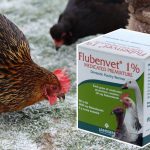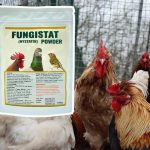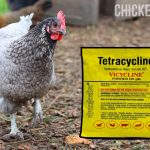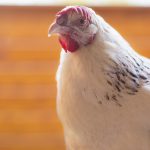Dogs Eating Chicken Poop – 10 Health Risks & Prevention
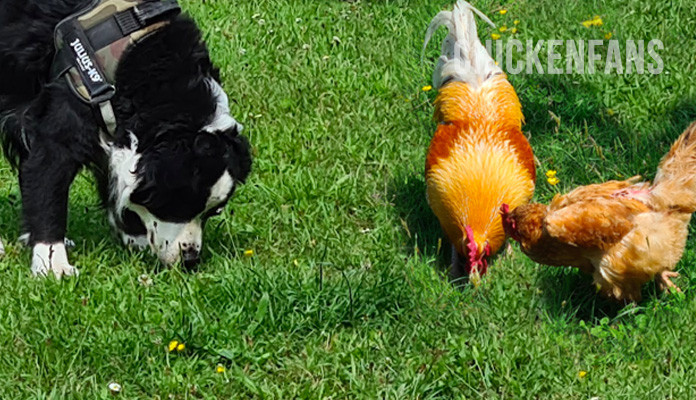
Some dogs eat whatever crosses their path. Rocks, trash, socks, and even poop. It drives many dog keepers crazy as it’s a worrying and disgusting habit that is dangerous for your pet.
What if they suddenly eat chicken poop? How harmful is it when a dog eats a chicken’s droppings?
Let’s find out.
- Why does my dog eat poop?
- Can a dog get sick from eating chicken poop?
- What diseases can a dog get from eating chicken poop?
- How to prevent dogs from eating poop
- Summary
Why does my dog eat poop?
Dogs eating poop, whether it’s their own poop or other animal droppings, is not uncommon. It even has a name: Coprophagia. Coprophagia is used for any animal that consumes feces, including humans. Quite a mouthful.
In dogs, coprophagia is most common in pups, as they explore their new world and want to try and eat everything that crosses their path. This can be dangerous. Not only do they eat poop, but they also consume non-digestible objects such as rocks, socks, and sticks.
Most pups get rid of this untasteful habit after a few months of developing an appetite for proper dog food.
Other reasons why your dog eats feces:
- Lack of nutrients and digestive enzymes in the food
- Inadequate amount of food
- Diabetes
- Parasite infection
- Irregular feeding schedule
- Cushing’s disease, giving them an insatiable hunger
- Boredom / under-stimulating environment
Coprophagia is primarily a behavioral issue rather than a medical problem. However, it’s important to rule out any underlying medical reasons why your dog eats poop. ‘Normal’ adult dogs have no real interest anymore in eating poop. If your dog insists on eating poop after twelve months, consult a vet to rule out medical conditions.
Can a dog get sick from eating chicken poop?
A dog can get sick from eating chicken poop, as chickens can carry several diseases that harm dogs. However, if both your chickens and dog are healthy, chances are slim the dog will get sick, and there is no need for unwarranted concerns. Most parasites like worms are species-specific, but some bacteria and fungi come with a risk.
The dog’s immune system will generally suppress any incoming hostile parasitic intruders. But if you have a pup or a dog with immunodeficiency developing diarrhea after eating chicken poop and your chickens have been sick in the last couple of months, contact a vet.
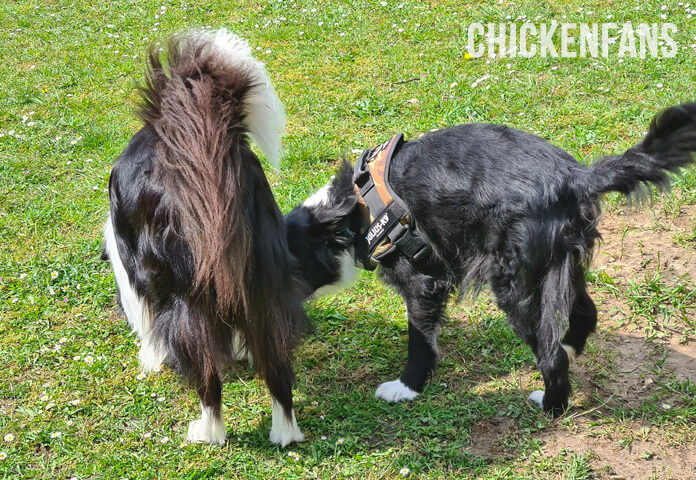
What Diseases Can A Dog Get From Eating Chicken Poop?
Let’s see what parasites and diseases an unfortunate dog can get when they start digging up some chicken poop.
Worms
All kinds of worms, roundworms, tapeworms, and gapeworms, are pretty common in chickens. Most of them can only affect chickens or birds, and almost none can develop in a dog’s intestines. You don’t really have to worry about worms. Check our article on poultry worms to learn more about worms in chickens.
In exceptional cases, chickens can be intermediate or paratenic hosts, where they are just carrying the eggs around.
One such example is the Spirometra tapeworm that lives in the dog’s intestines. The eggs of the tapeworm hatch in water and are first eaten by copepods, tiny plankton found in nearly every freshwater. In copepods, the eggs hatch into larvae. Then, the copepods are eaten by a secondary host that will carry the larvae without developing the worms. These secondary hosts can be almost any animal, such as fish, frogs, birds, or our backyard chickens drinking from the water. When dogs eat infected chicken droppings, the worms will infect the dog’s intestines.
Parasites
Parasites which are often feared, like coccidian protozoa causing coccidiosis, are usually host-specific. Although both dogs and chickens can suffer from coccidiosis, the infecting protozoa are from a different genus. Coccidiosis in poultry is caused by Eimeria protozoa, whereas Cystoisospora Canis cause coccidiosis in dogs. So there is no risk for coccidiosis.
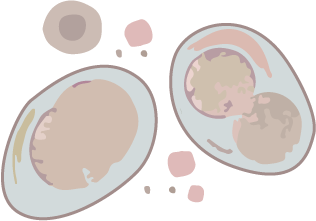
That said, there are exceptions. Some parasites can infect a wide range of animal species.
Toxoplasmosis
One such exception is the protozoa Toxoplasma gondii that causes Toxoplasmosis in dogs. Chickens are regarded as one of the most important hosts for Toxoplasma gondii infections in humans. The same holds for dogs, as the parasite can infect almost all animals.
Toxoplasma gonddi infection is widespread in backyard chickens worldwide, but chickens rarely develop the disease as they are resistant. In dogs, especially puppies and weak dogs, toxoplasmosis can spread through the body with severe consequences. Infected dogs develop diarrhea, cough, jaundice, and seizures, which can be fatal.
Cryptosporidiosis
Cryptosporidiosis is caused by the protozoan parasite Cryptosporidium. Many strains of the parasite can affect both chickens and dogs, sometimes also humans. Chickens get diarrhea, pale combs, nasal discharge, and cough.
Dogs can get infected when they eat the feces of an infected chicken. The eggs (oocysts) of the parasite can survive for more than half a year in moist environments and water sources.
Most dogs won’t get sick or will only develop mild diarrhea. Weaker dogs can get ill and build fever and violent diarrhea. In severe cases, you can not let the disease run its course, and it must be treated with antiparasitic medication.
Giardiasis
Another less common disease is Giardiasis, caused by Giardia protozoa. The protozoa live in the chicken’s intestines, and the cysts can be found in chicken droppings.
Dogs that snack on the chicken droppings can become infected. Infection in dogs comes with weight loss, (greenish) diarrhea, and vomiting. Giardiasis can be treated with antiprotozoal medication.
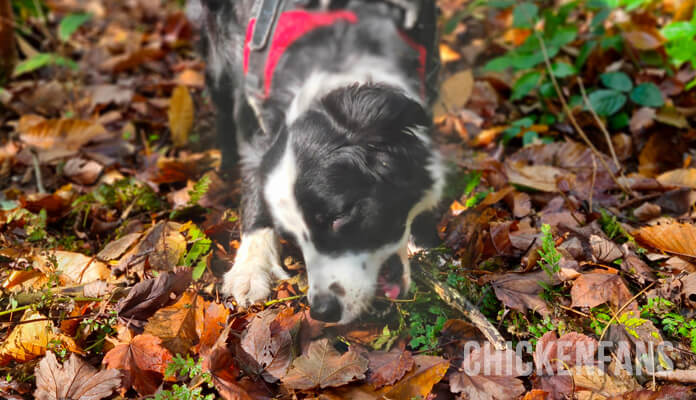
Bacteria
The most significant risk from eating chicken droppings comes from several families of bacteria and fungi that can cause severe diseases. Most bacterial and fungal infections we will discuss can also affect humans.
Diseases caused by bacteria transmitted via chicken droppings:
- Chlamydiosis
- Salmonellosis
- Tuberculosis
- Pseudotuberculosis
Chlamydiosis
Chlamydiosis is caused by Chlamydia psittaci bacteria. It’s very common in pigeons and backyard chickens. The disease has many forms in chickens and can go without any clinical signs of illness. Dogs can become infected by eating the bacteria in the chicken’s droppings.
Dogs that get chlamydiosis develop diarrhea, dry cough, vomit, and can suffer from lung infections. Luckily the disease is relatively rare for dogs and can be treated by antibiotics.
Salmonellosis
Salmonellosis is a name for the group of diseases that can result from a Salmonella infection. Salmonella bacteria are a normal part of the chicken’s microbiome and are part of a healthy chicken’s intestine. In a healthy flora, there is always a limited amount of Salmonella to be found. Salmonella diseases only develop after sudden overgrowth of bacteria or by oral ingestion. That’s why Salmonella bacteria can be found in chicken droppings even if the birds appear healthy and clean.
Dogs can get infected when they consume chicken droppings. A salmonella infection can make your dog sick, causing (bloody) diarrhea, vomiting, fever, lethargy, and tiredness. Salmonella infection can be lethal for old dogs with a compromised immune system. Severe cases can be treated with antimicrobial medication.
Tuberculosis
Tuberculosis in chickens is a slow-developing disease caused by Mycobacterium Avium. Infected chickens will get diarrhea, pale combs, and difficulty breathing, but there is a long incubation period. The bacteria are shed in the chicken’s droppings and can survive for years. Wild birds and rodents can also introduce Mycobacterium Avium.
When dogs eat chicken poop, they ingest the organisms or inhale the contaminated dust via aerosols. Tuberculosis in dogs is typically caused by Mycobacterium tuberculosis, but the Mycobacterium avium in the chicken droppings can also infect dogs.
Most infected dogs will not get sick, as the immune system can suppress the bacteria. However, sometimes dogs can get sick, weak, cough, develop a fever, and suffer from weight loss.
Unfortunately, there is no medication to treat tuberculosis yet, and infected animals are often euthanized to prevent transmission to children.
Pseudotuberculosis
Pseudotuberculosis is a disease with symptoms that resemble the symptoms of tuberculosis. It’s caused by the bacteria Yersinia pseudotuberculosis, and dogs can also ingest it via chicken poop. Infected dogs will get diarrhea and symptoms that are similar to tuberculosis. Antibiotics can treat severe infections.
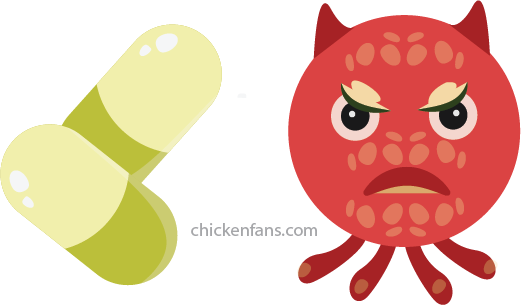
Fungi
As if bacteria are not enough, some fungi come with the risk of diseases too:
- Cryptococcosis
- Aspergillosis
- Histoplasmosis
Fungal infections can have severe outcomes. When your dog gets sick, prevent any further contact with chicken droppings.
Cryptococcosis
Chicken droppings can contain fungal spores of Cryptococcus Neoformans, the cause of cryptococcosis. It usually comes in the form of yeasts, but warm and moist chicken droppings can have the raw non-capsulated form. Infections happen by inhalation through the dog’s nose when the dog is eating the chicken poop.
An infection will target the dog’s respiratory tract, central nervous system, eyes, and skin and can cause seizures and meningitis. If left untreated, the disease can be fatal. Luckily, antifungal medication is available, but sometimes surgery is necessary. Treatment can take months, and any damage to the nervous system can be permanent.
Aspergillosis
Aspergillosis in chickens is a fungal respiratory infection caused by Aspergillus spores, a common mold in poultry. It can come in acute and chronic forms, but the infection can also stay dormant in the chicken’s air sacs.
When your dog is eating chicken poop and scratching the soil, he generates large amounts of dust particles and inhales the Aspergillus spores.
Typical infections affect the nose and result in sneezing and nosebleeds. Antifungal medication can treat nasal and respiratory infections.
Sometimes Aspergillosis will spread to the lungs and cause infections. In rare cases, aspergillosis spreads to other organs and becomes systemic. Those cases are often fatal.
Histoplasmosis
Histoplasmosis is another fungal infection caused by the fungus Histoplasma casulatum. The fungus occurs worldwide and is often seen in river valleys and in Central and Eastern United States. The fungus is commonly seen together with other fungi like Aspergillus.
The fungus can be found in chicken droppings, and the mixture of soil and chicken poop is the perfect breeding ground for the mold. In areas where the fungus is prevalent, birds like starlings spread the fungus to the chicken run.
When dogs eat infected chicken poop, they inhale the fungus spores shed by the droppings. The fungus infects the lungs. Dogs develop a mild fever and cough, stop eating, and can be lethargic. The disease can spread to the guts and cause diarrhea. Occasionally the infection can spread to other organs.
Histoplasmosis can be treated with newer antifungal medications, but it can take many months to recover, and some dogs won’t make it.
Viruses
Viruses are typically host-specific, even if they reside in the same viral family. It’s very unlikely that your dog will get sick from catching a virus in chicken droppings.
Various online articles state your dog can get infected with parvovirus, a common virus found in chickens and turkeys. The chances of your dog getting infected by eating chicken poop are nearly nonexistent. Chickens get infected by the Aveparvovirus, while dogs can only get infected by the Canine parvovirus, a completely different strain.
Some other sources warn of Avian flu, but there have only been some very anecdotal reports on avian influenza transmissions to dogs. In 2006, one dog became infected after eating an infected duck in Thailand and died after five days. There have also been some experiments in clinical settings where dogs seemed susceptible to particular strains of H5N1 HPAI.
However, canine influenza is entirely different from avian influenza. A dog will not get Avian flu or influenza from eating chicken poop.
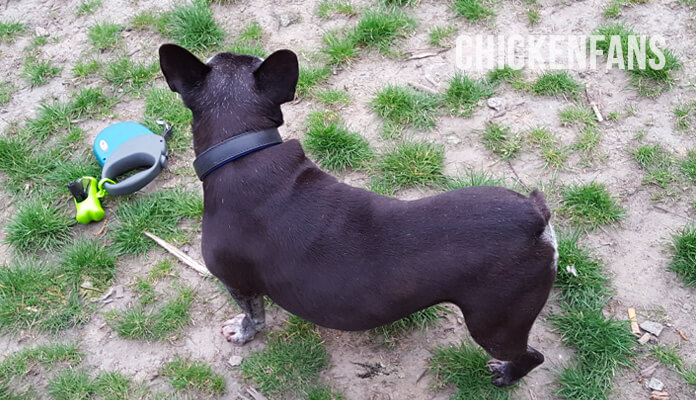
How to prevent dogs from eating poop
As said before, most dogs won’t eat poop anymore after they’ve reached adulthood. But we understand the need to keep feces out of your dog’s mouth, so here are some simple tricks to unlearn your dog to eat any poop.
- Change the dogs’ diet and feeding schedule
- Pick up any feces
- ‘Leave it’ and ‘Drop it’ command
- Active lifestyle
- Veterinarian examination
Change the dogs’ diet and feeding schedule
When a dog’s diet lacks nutrients and calories or when there aren’t enough digestive enzymes in the dog food, your dog searches everywhere for extra nutrients, even in poop. The same goes for feeding them an inadequate amount of food, which makes them hungry and activates their scavenging tendencies. When there isn’t much food around, anything will do!
Ensure you feed your dog a proper amount per day and only provide them quality food that’s high in nutritional value and fiber. Dogs are carnivores with a slightly omnivorous nature, so their food must contain both meat/poultry but can be supplemented with grains and vegetables.
Pick up any feces
Pick up after your dog when he poos, even in your own backyard. If you have any other animals, like chickens, keep them in a closed run so the dog can’t reach their droppings. When free-ranging your chickens, keep them temporarily inside the run until the dog has unlearned its poo-eating behavior.
‘Leave it’ and ‘Drop it’ commands
You can teach your dog to leave undesirable objects or to drop things on your command by rewarding them with a treat. Teaching dogs to release anything they find in the wild can be challenging. When their instincts kick in, they can swallow wandering poo before you even notice. So it’s best to be proactive and warn them when they start sniffing the poo.
Active lifestyle
Coprophagia is primarily a behavioral issue rather than a medical problem. Most dogs eat poop because of boredom or see it as a way to catch your attention. Ensure your dog has plenty of exercise during the day and keep him company as much as possible. An active and playful dog is less likely to eat things he shouldn’t.
Veterinarian examination
When your dog keeps on eating poop, and nothing behavioral seems to be the problem, take him to the vet for a complete examination. While relatively rare, some diseases like Cushing’s disease and diabetes can result in poop eating. It’s better to be safe than sorry and rule out medical conditions.
Summary
There are several reasons why dogs eat poop. It’s common for pups, and they might still do it when they get older. Sometimes it’s just a habit, but it can also signify an underlying condition where the dog is missing vital nutrients.
Chicken poop is not the healthiest food source for canines. Dogs can get sick from bacteria, fungi, and parasites that thrive in chicken droppings. However, there is no reason for unwarranted concerns. Most dogs will not get sick after eating chicken poop once.
That said, there is a risk involved. Contact a vet when you have a young pup or your dog has an immunodeficiency and develops diarrhea after eating chicken poop, especially when your chickens have been sick in the weeks or months before your dog started snacking the droppings.
Be aware that there is much disinformation on the internet. Your dog won’t get the Avian flu or catch a parvovirus. The most significant risk comes from an infection with bacteria or fungi.
There are multiple ways to prevent your dog from eating chicken droppings and animal poop. The best strategy to unlearn the filthy habit depends entirely on the dog’s situation and environment.
